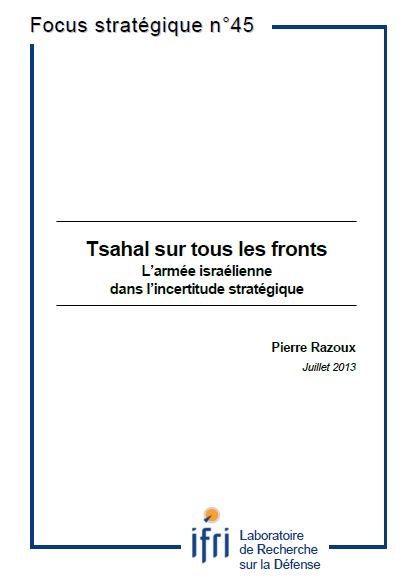Tsahal sur tous les fronts : L'armée israélienne dans l'incertitude stratégique

Facing threats on all its borders, as well as social, economic and religious tensions, the Israeli Defense Forces (IDF) is now under significant pressure for ensuring its core mission: the survival of the State of Israel.
While the post-Arab Spring Middle East appears to be cursed with persistent political instability, endemic violence and terrorism, the IDF now attempts to keep a full-spectrum capability, fitted to adapt to any situation, simultaneously if needed. To this end, the IDF envisions both defensive (territorial fence, deterrence, antimissile defense) and offensive (long range strikes and special operations forces raids) strategies. In order to keep up with such an ambitious agenda, the IDF needs to keep on upgrading its different services (land forces, air forces, navy, and, increasingly, cyber) in a sustainable way for both its economy and society.
This paper is published in French only – Tsahal sur tous les fronts : L'armée israélienne dans l'incertitude stratégique
Related centers and programs
Discover our other research centers and programsFind out more
Discover all our analyses"Iron Swords" A Military Analysis of Israel's War in Gaza
On October 7, 2023, Hamas' attack, dubbed “Al-Aqsa Flood,” caused a major shock and led Israel to launch the longest war in its history. Operation “Iron Swords” was notable for its unprecedented intensity, both in terms of the massive ground forces deployed and the firepower used.
Saudi Arabia’s Nuclear Temptations. Lessons Learned from Regional Instability
Saudi Arabia’s integration in the international arena and regional stability, notably through reducing its dependence on fossil energies, are crucial elements for the success of the Kingdom’s Vision 2030, the Crown Prince’s top priority. However, Mohammed bin Salman’s declarations in 2018 and 2021, indicating that “if Iran develops a nuclear bomb, we will follow suit as soon as possible”, combined with the recent strikes on key Iranian nuclear facilities, do not bode well for the future of the Kingdom, the region and the non-proliferation regime at large.
The Future of Air Superiority. Command of the Air in High Intensity Warfare
Air superiority, understood as control of the air, is a cornerstone of the Western art of warfare. It is a decisive condition, albeit not sufficient by itself, to achieve military victory, as it enables the concentration of air power toward the achievement of wider strategic objectives and protects other components from unbearable attrition levels. It is best achieved through the offensive use of air power in a joint effort to neutralize the enemy’s air power.
Europe Uncovered?
As Russia continues to threaten Europe, the Trump administration is making no secret of its desire to withdraw—at least partially—from the defense of the Old
Continent in order to focus on strategic competition with China. It is thus putting pressure on its European allies to increase their investment in the military sector. The NATO Summit in The Hague in June 2025 resulted in ambitious commitments by member states to increase their defense spending.










